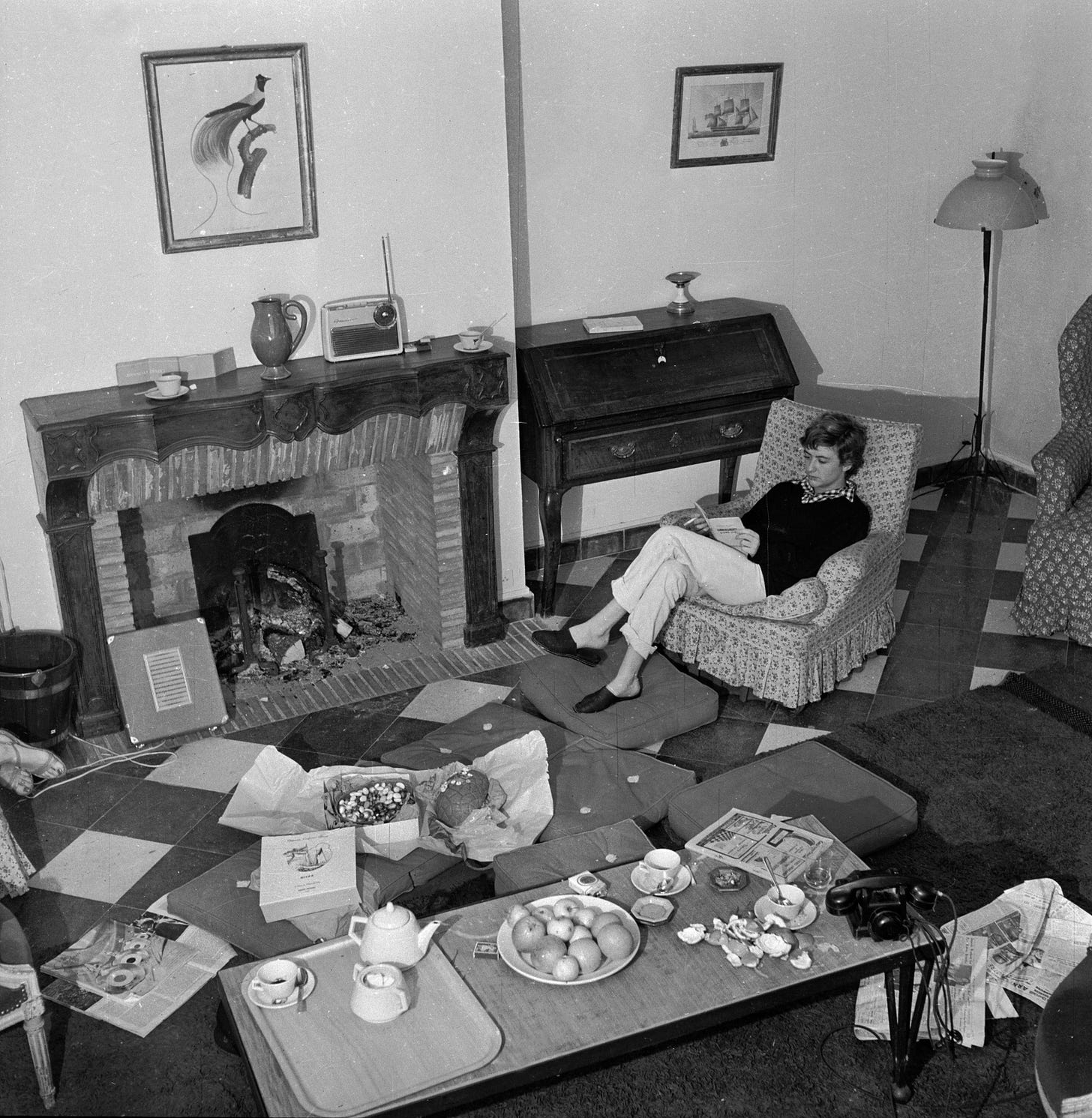Françoise Sagan on the power of laziness
A timely reminder from the author of Bonjour Tristesse
Prolific writers have always fascinated and intimidated me. The Anthony Trollopes and Charles Simenons and Joyce Carol Oateses of the world: How do they do it? For a long time I assumed the secret was a great wellspring of self-discipline that they could drink from unceasingly, like hamsters at the sipper. But what if the secret is a deep underlying laziness?
It’s a theory I’ve been mulling over since last week, when I revisited a book of interviews with the French writer Françoise Sagan (1935–2004), who wrote her first novel, Bonjour Tristesse, when she was eighteen and went on to publish an additional nineteen novels, three books of short stories, nine plays, two biographies, and several collections of nonfiction. (I was thinking about Sagan because of the new film adaptation of Bonjour Tristesse, which looks almost unbearably sultry—has anyone seen it?)
I’d call twenty novels and a dozen-plus other works pretty prolific—but you don’t have to read much about Sagan to realize that she was not a possessor of tremendous BDE (Big Discipline Energy). She wrote Bonjour Tristesse “in two or three months, working two or three hours a day,” she told the Paris Review the year after it came out. And she certainly didn’t adopt a hustle mindset after that. I loved this exchange from her book of interviews, published in 1974:
Are you as lazy as people say you are?
It’s very difficult to be very lazy. It takes a lot of imagination to do nothing and you have to be sufficiently self-confident not to have a bad conscience. You have to have a taste for life, so that every minute is complete in itself and so you don’t have to keep saying “I’ve done this or that.” You need strong nerves to do nothing. Being lazy also means that other people’s opinions don’t matter. Nor does the idea of always having to prove yourself.
Imagination, self-confidence, strong nerves, and “a taste for life”—the qualities that Sagan lists as requirements for true laziness are also a pretty perfect list of the qualities needed to be a writer or an artist.
Which isn’t to say that discipline isn’t also required. But Sagan knew that laziness and discipline are two sides of the same coin. “I may be lazy, but I enjoy working, too,” she said. “The pleasure I derive from my work overcomes the laziness and I work for a while.”
If there’s any spirit I would like to carry forth into this summer, it’s this one—to let the pleasure of work overcome my natural laziness (for a while), and otherwise to remember that every minute is complete in itself.
WORM SCHOOL EXTENSION, EXTENDED!
I’ve decided to extend the enrollment period for Worm School Extension, my summer mini-series on the five things that helped me finally, actually, for-real get my long-overdue book project done. The series is for paid subscribers only, who will receive the five lessons weekly from June 10–July 8. If you’re not yet a paid subscriber, you can become one here:
Quick reminder that paid subscribers also get access to:
Worm Zoom, my virtual coworking club, which meets every weekday from 6–8am Pacific / 9–11am Eastern / 2–4pm UK time
The full archive of 150+ back issues—including the original, eight-part Worm School, aka everything I’ve learned about building a sustainable creative practice from 15+ years of reading/writing about artists’ habits
Future subscriber-only perks launching later this summer. (In particular, I’m thinking about bringing back the advice column. If you have a burning creative dilemma in need of solutions, please email me and I’ll consider it for the relaunch.)
My sincere gratitude for your support! This newsletter wouldn’t be possible without the Subtle Patrons who have generously opted for a paid subscription. Thank you! 🙏
HEROES AND NOVELISTS
Françoise Sagan’s Paris Review interview is worth reading in its entirety. I especially enjoyed this exchange:
Is it possible that novels get written because the novelist imagines himself in the role of a novelist writing a novel?
No, one assumes the role of hero and then seeks out “the novelist” who can write his story.
And one always finds the same novelist?
Essentially, yes. Very broadly, I think one writes and rewrites the same book. I lead a character from book to book, I continue along with the same ideas. Only the angle of vision, the method, the lighting, change.
I find that last part weirdly comforting. We writers may think that we’re laboring mightily to produce bracingly original new works, when in reality we’re just dog-paddling around the same little pool of interests and obsessions we’ve always had—another nice image for the summer ahead.
RELATED ISSUES
From the archive:
Thanks for reading! This newsletter comes out every other Tuesday—and you can help keep it coming by upgrading to a paid subscription, buying one of my Daily Rituals books, forwarding this email to a friend, or even just clicking the “like” button below.











I had a boss once who imagined Joyce Carol Oates’ prolific output was a result of her having a typewriter in every room of her house, and every time she entered a room she would write a bit. This fake explanation still lives rent-free in my head as the source of JCO’s productivity.
what a great topic. thanks for pulling that quote from Sagan on laziness! Inspiring.